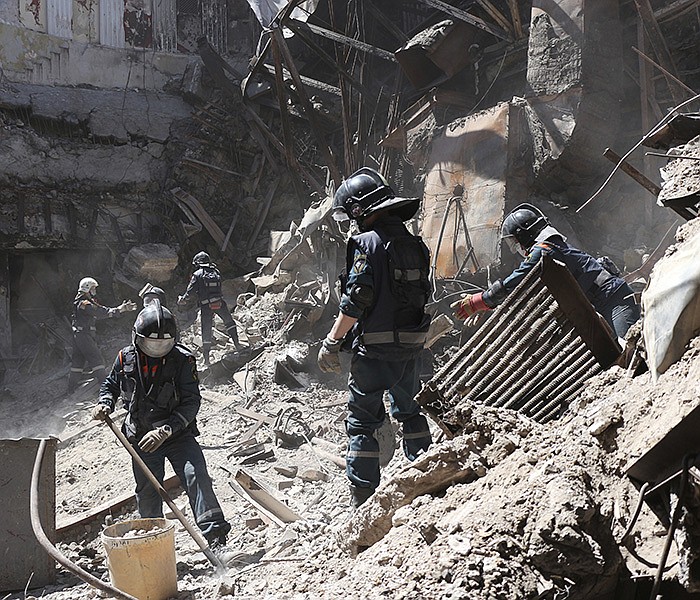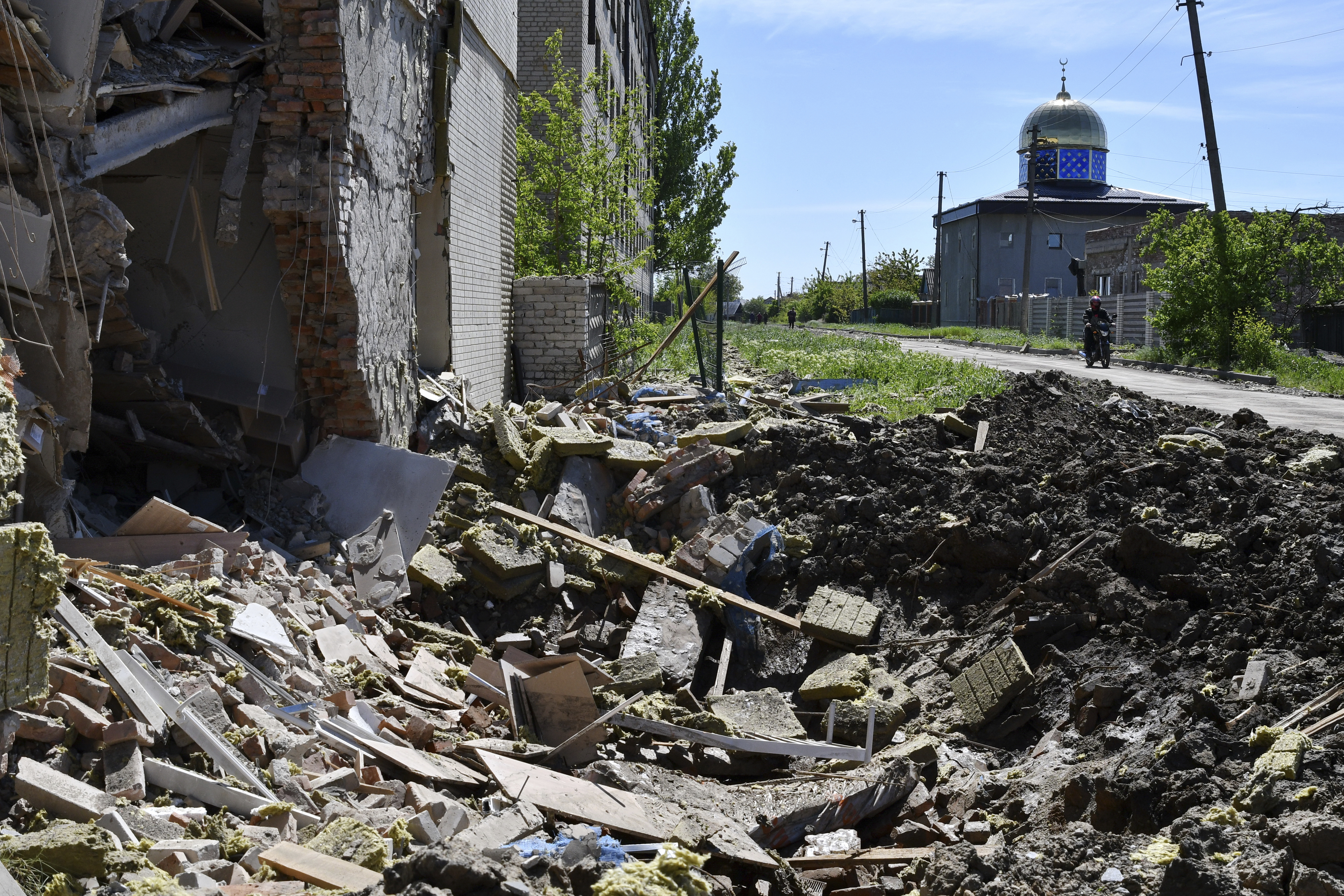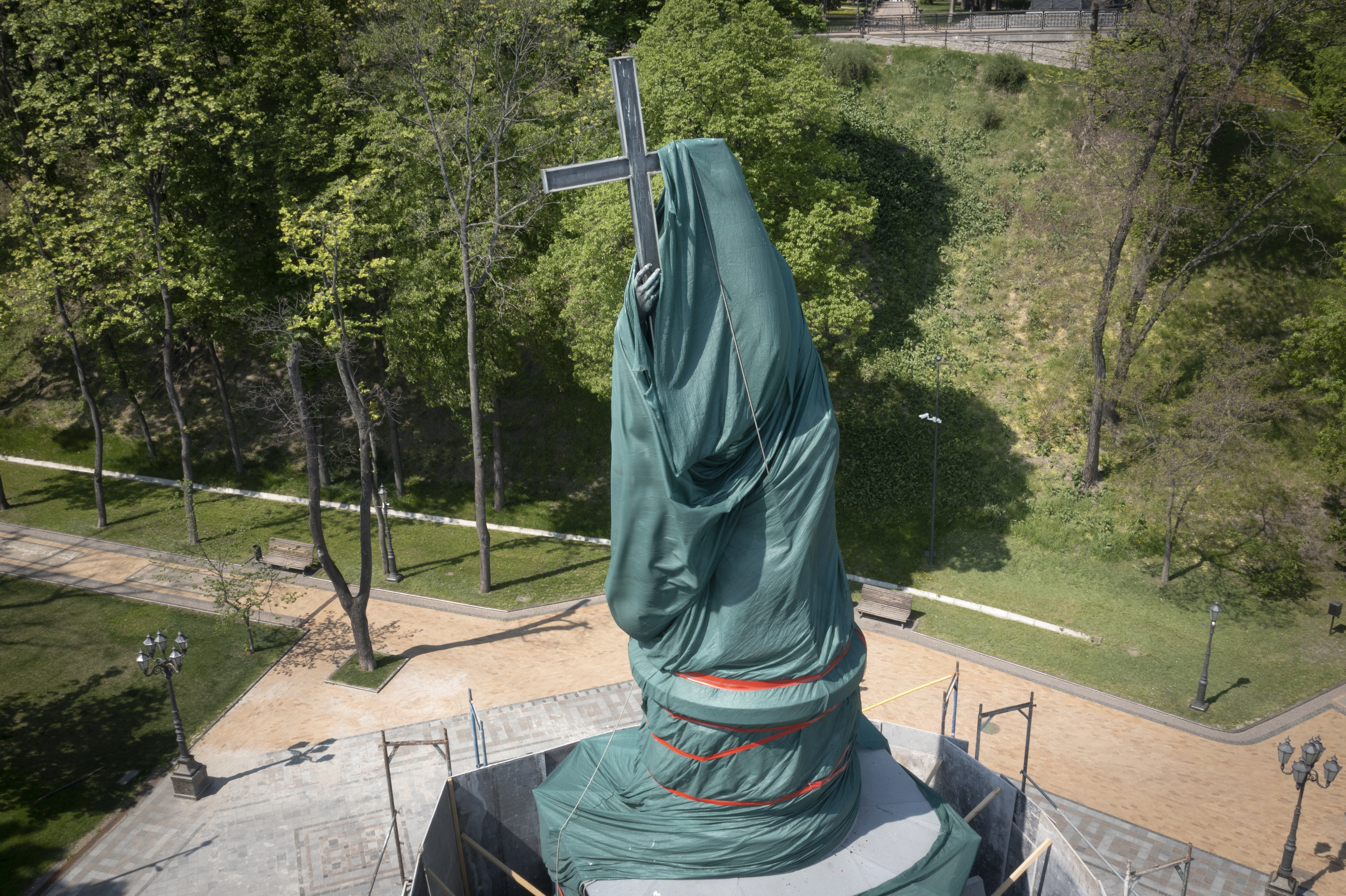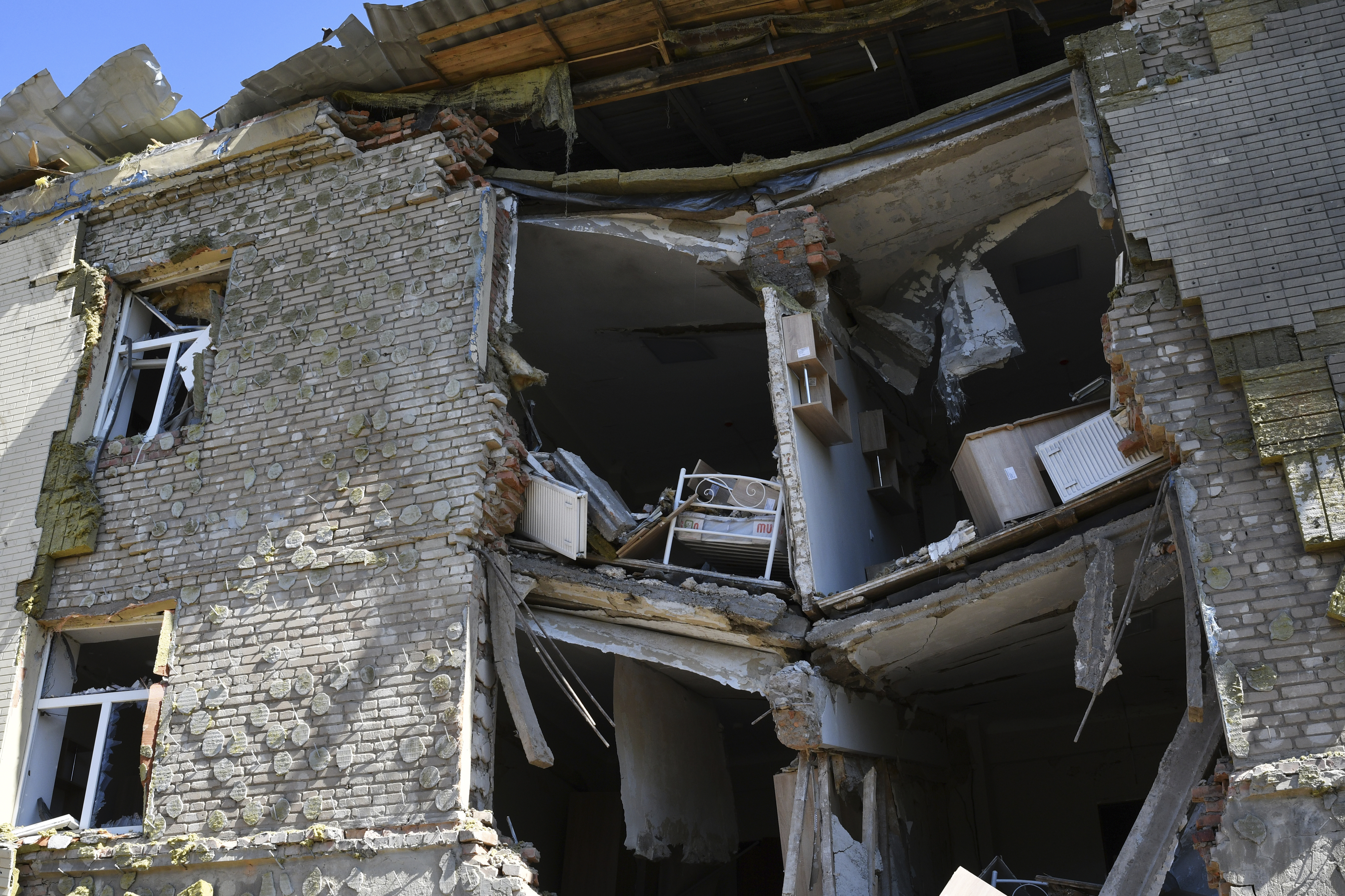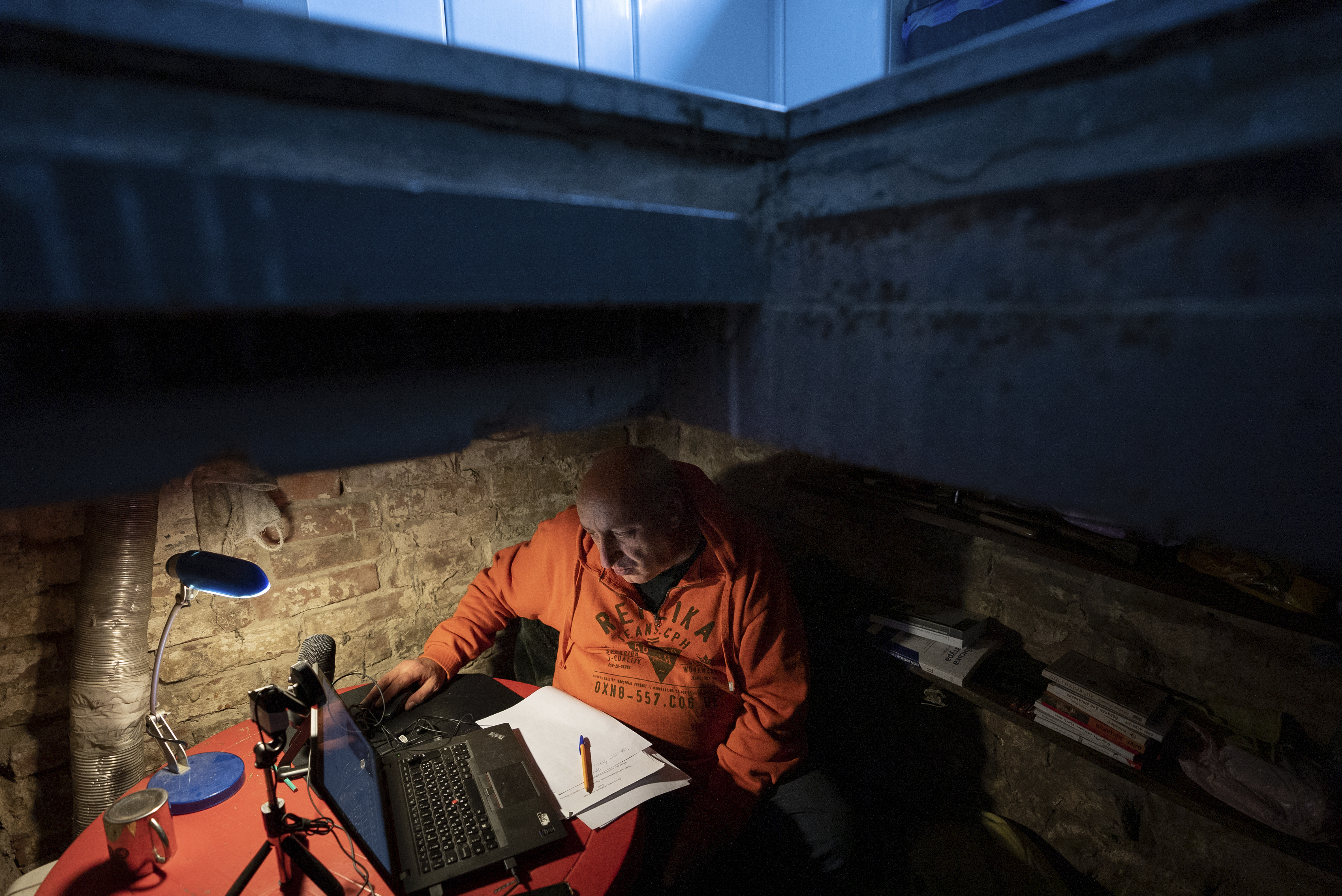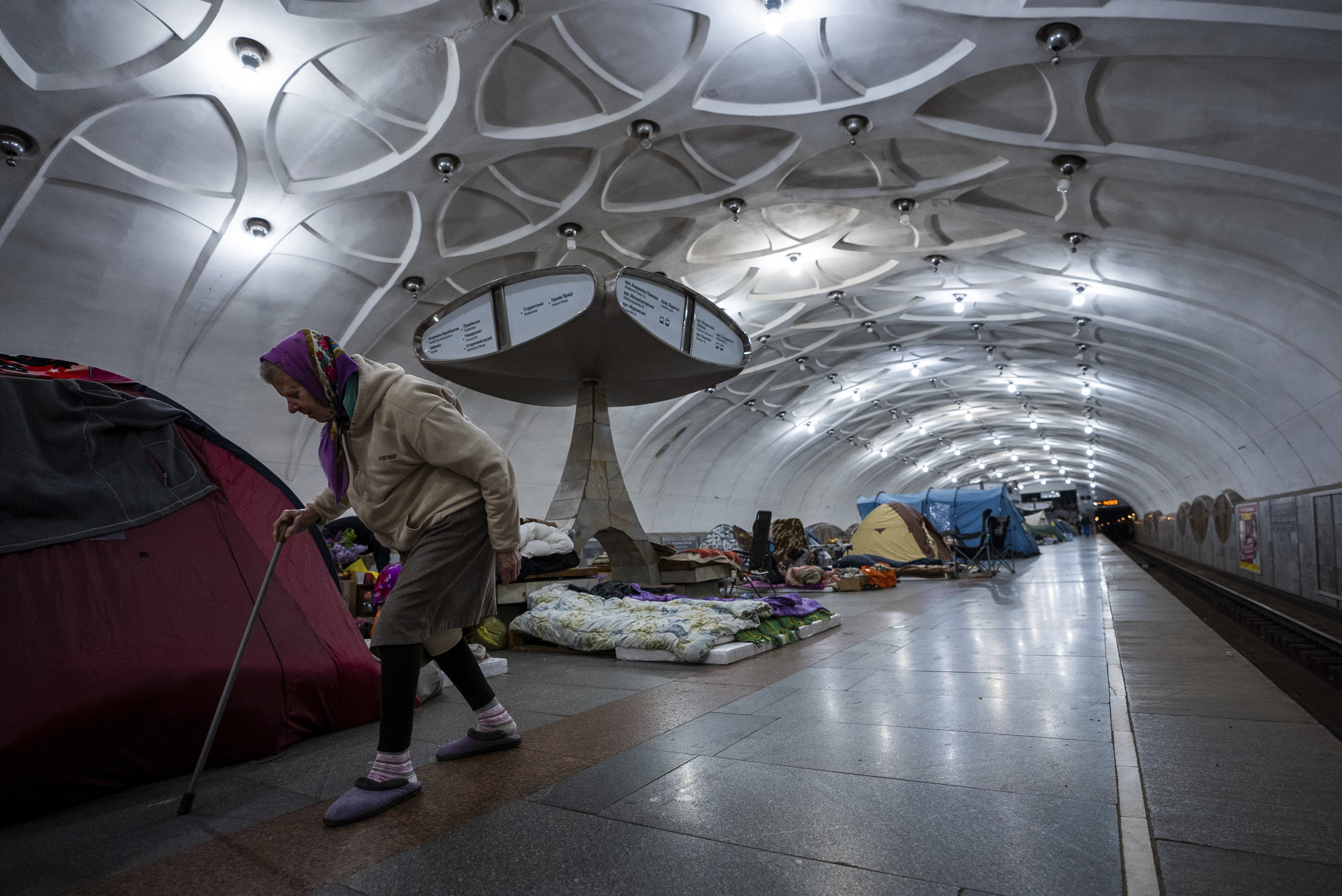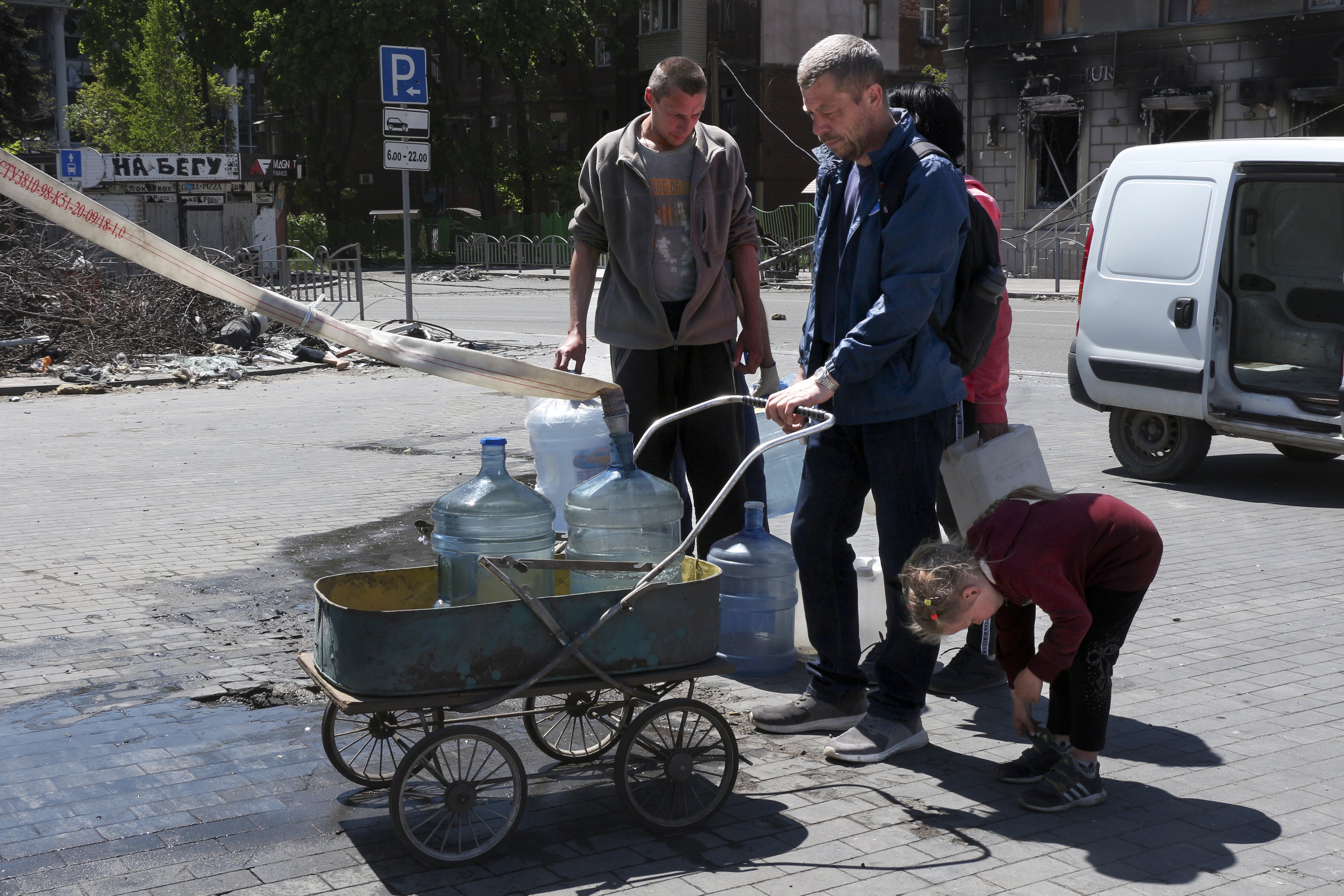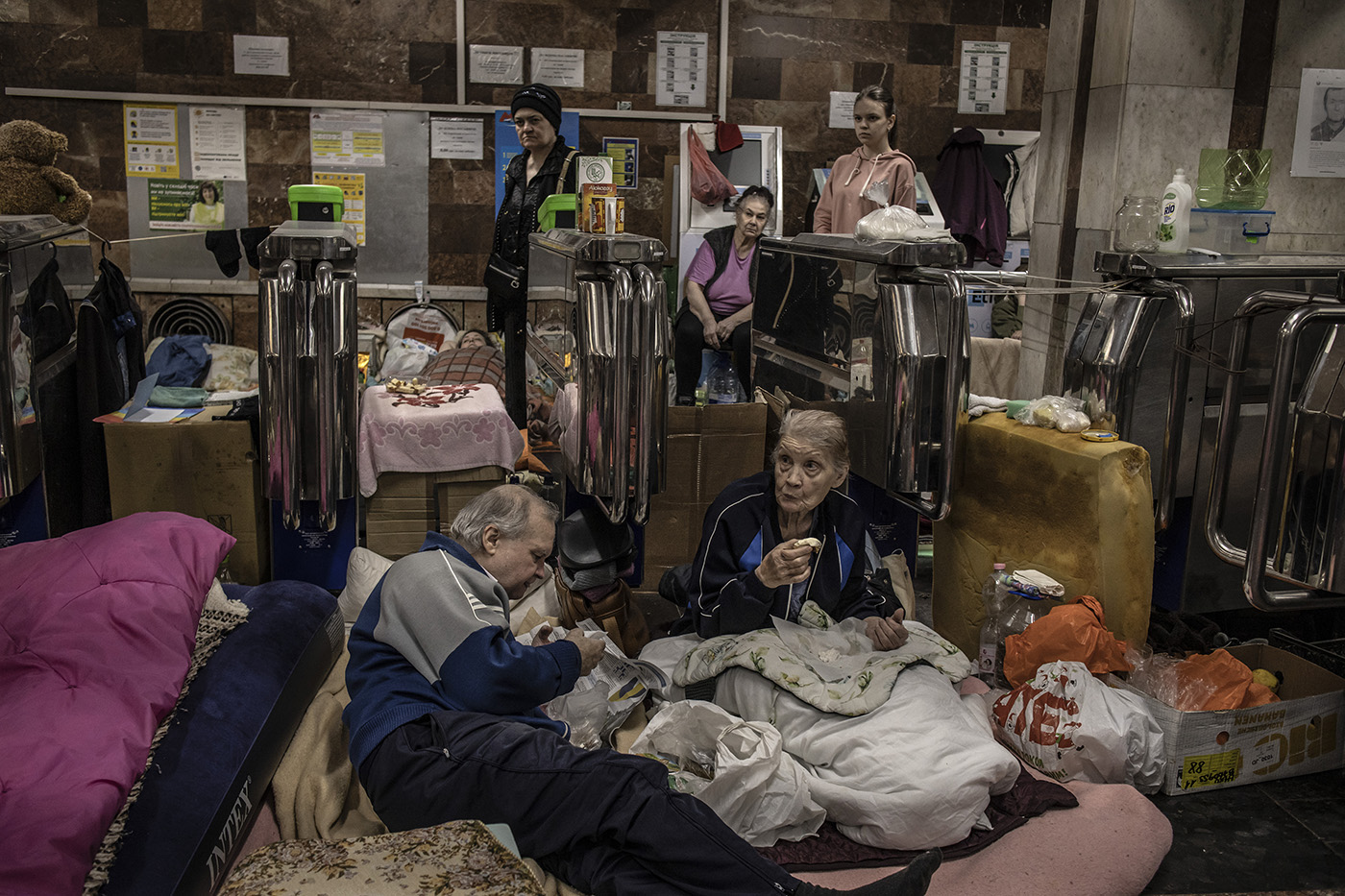KYIV, Ukraine -- Finland's leaders Thursday came out in favor of applying to join NATO, and Sweden is considering whether to do the same within days, in a historic realignment on the continent 2½ months after Russian President Vladimir Putin's invasion of Ukraine.
The Kremlin reacted by warning that it will be forced to take retaliatory "military-technical" steps.
President Sauli Niinisto and Prime Minister Sanna Marin, Finland's highest-ranking policymakers, announced that the Nordic country should apply right away for membership in NATO, the military defense pact founded in part to counter the Soviet Union.
"Finland must apply for NATO membership without delay," Niinisto and Marin said in a joint statement Thursday. Membership in the North Atlantic Treaty Organization would make Finland safer, and "as a member of NATO, Finland would strengthen the entire defense alliance," they said.
While the country's Parliament still has to weigh in, the announcement means Finland is all but certain to apply -- and gain admission -- though the process could take months to complete. Sweden, likewise, is considering putting itself under NATO's protection.
Sweden plans to send an application on Monday, the Expressen newspaper reported on Thursday, citing sources it didn't identify.
That would represent a major change in Europe's security landscape: Sweden has avoided military alliances for more than 200 years, while Finland adopted neutrality after its defeat by the Soviets in World War II.
Such an expansion of the alliance would leave Russia surrounded by NATO countries in the Baltic Sea and the Arctic and would amount to a setback for Putin, who had hoped to divide and roll back NATO in Europe but is instead seeing the opposite happen.
With Russian aggression suddenly changing perceptions in Europe of regional threats, countries including Germany have switched toward rearmament, Sweden's neighbor Denmark is holding a referendum on joining the European Union's military cooperation, and NATO is boosting its deterrence in the east.
The Nordic countries are seeking to deter aggression from Russia, which has threatened the pair with consequences if they join the bloc. The attack, which Putin has repeatedly called "inevitable," shifted popular opinion in both Nordic countries to favoring the entry.
Kremlin spokesman Dmitry Peskov said Finland joining NATO would "definitely" be a threat to Russia.
"The expansion of NATO doesn't make our continent more stable and secure," he told reporters, avoiding a direct response when asked whether the Kremlin expected Finland's likely move as a potential result of its invasion of Ukraine.
The Finnish president and prime minister's approval comes ahead of the biggest coalition party -- the Social Democrats -- setting their official stance on Saturday, with a formal decision seen coming on Sunday. The parliament, where more than 2 in 3 lawmakers support the application, is preparing for a debate on Monday, Speaker Matti Vanhanen said Thursday.
NATO Secretary-General Jens Stoltenberg said Finland would be "warmly welcomed" into the alliance should it decide to apply, adding that the accession process would be "smooth and swift." He backed Niinisto and Marin's comments saying their country's membership would strengthen both NATO and Finland's security, and underscore NATO's open-door policy.
NATO allies are expected to unanimously back any bids by Finland and Sweden, diplomats said. The membership bids would need to be ratified by NATO countries' parliaments, a process that can take months, before they gain entry and begin to enjoy collective defense commitments under Article 5.
Both countries have already won security pledges from the U.S. and on Wednesday signed cooperation agreements with the U.K.
Policymakers are now bracing for retaliation from Russia, which has threatened them with "serious consequences" and with bringing nuclear weapons into its Baltic exclave of Kaliningrad if they join. Officials in neighboring Lithuania say that move already happened years ago.
Before invading Ukraine, Putin demanded that NATO should guarantee it won't expand eastward.
Kremlin spokesman Peskov didn't elaborate on what Russia might do if Finland does join the alliance, saying only the response will depend on "how much military infrastructure moves toward our borders." He noted that Putin earlier this year ordered the Defense Ministry to come up with proposals to strengthen Russia's western flank, though no results of that effort have yet been made public.
The war shows Russia is "ready to attack a neighboring country," Niinisto said on Thursday. "So, when you ask how they see possible Finnish joining," he said, "my response would be that you caused this, look at the mirror."
NATO's funneling of weapons and other military support to Ukraine already has been critical to Kyiv's surprising success in stymieing the invasion, and the Kremlin warned anew in chilling terms Thursday that the aid could lead to direct conflict between NATO and Russia.
"There is always a risk of such conflict turning into a full-scale nuclear war, a scenario that will be catastrophic for all," said Dmitry Medvedev, deputy head of Russia's Security Council.
RUSSIA PUMMELS DONBAS
On the ground, meanwhile, Russian forces pounded areas in central, northern and eastern Ukraine, including the last pocket of resistance in Mariupol, as part of its offensive to take the industrial Donbas region, while Ukraine recaptured some towns and villages in the northeast.
The first war-crimes trial of a Russian soldier since the start of the conflict is set to open Friday in Kyiv. A 21-year-old captured member of a tank unit is accused of shooting to death a civilian on a bicycle during the opening week of the war.
While Russia's advance in the Donbas has been slow, its forces have gained some ground and taken some villages.
Four civilians were killed Thursday in three communities in the Donetsk region, which is part of the Donbas, the regional governor reported.
Britain's Defense Ministry said Russia's focus on the Donbas has left its remaining troops around the northeastern city of Kharkiv vulnerable to counterattack from Ukrainian forces, which recaptured several towns and villages around the city.
Russian strikes Thursday killed at least two civilians on the outskirts of Kharkiv, Ukraine's second-largest city, local authorities said.
The attacks also damaged a building housing a humanitarian aid unit, municipal offices and hospital facilities, Vyacheslav Zadorenko, the mayor of the suburban town of Derhachi, wrote in a Telegram post.
None of the sites "had anything to do with military infrastructure," Zadorenko said.
Fighting across the east has driven many thousands of Ukrainians from their homes.
"It is terrible there now. We were leaving under missiles," said Tatiana Kravstova, who left the town of Siversk with her 8-year-old son Artiom on a bus headed for the central city of Dnipro. "I don't know where they were aiming, but they were pointing at civilians."
Ukraine also said Russian forces had fired artillery and grenade launchers at Ukrainian troops around Zaporizhzhia, which has been a refuge for civilians fleeing Mariupol, and attacked in the Chernihiv and Sumy regions to the north.
Overnight airstrikes near Chernihiv, in northern Ukraine, killed at least three people, Ukraine's military said.
It said that Russian troops fired rockets at a school and student dormitory in Novhorod-Siversky and that some other buildings, including private homes, were also damaged.
In his evening address to the nation, Ukrainian President Volodymyr Zelenskyy condemned the assaults.
"Of course, the Russian state is in such a state that any education only gets in its way. But what can be achieved by destroying Ukrainian schools? All Russian commanders who give such orders are simply sick and incurable."
Noting that Thursday is International Nurses Day, Zelenskyy said the Russian military had damaged 570 medical facilities since the invasion began on Feb. 24 and fully destroyed 101 hospitals.
Twelve Russian missiles struck an oil refinery and other infrastructure in the central Ukrainian industrial hub of Kremenchuk on Thursday, the region's acting governor, Dmytro Lunin, wrote in a Telegram post. In early April, he said, the refinery, which had been the last fully functional one in Ukraine at the time, was knocked offline by an attack.
In the southern port of Mariupol, which has largely been reduced to smoking rubble with little food, water or medicine, or what the mayor called a "medieval ghetto," Ukrainian fighters continued to hold out at the Azovstal steel plant, the last stronghold of resistance in the city.
Ukrainian Deputy Prime Minister Iryna Vereshchuk said negotiations were under way with Russia to win the release of 38 severely wounded Ukrainian defenders from the plant. She said Ukraine hoped to exchange them for 38 "significant" Russian prisoners of war.
U.N. PROBES ABUSES
Meanwhile, the United Nations Human Rights Council voted Thursday to deepen an investigation into alleged rights abuses by Russian forces near Ukraine's capital, Kyiv, and other regions of the country.
The council in March established an international commission of inquiry to probe all human rights violations during Russia's invasion of Ukraine. The vote on Thursday at a special session of the council passed a resolution urging the commission's investigators to focus their efforts on incidents near Kyiv, as well as the regions of Chernihiv, Kharkiv and Sumy, all of which were occupied by Russian forces in late February and March.
The measure passed with 33 votes in favor and only two countries -- China and Eritrea -- voting against. Russia was suspended from the council last month and has denied that its troops targeted civilians for abuse.
China said that it voted against the measure because it was "neither balanced nor objective" and would only serve to escalate tensions. Russia's ambassador in Geneva also accused Western nations of "organizing ... to demonize Russia."
U.N. High Commissioner for Human Rights Michelle Bachelet told member states Thursday that her team had collected evidence of hundreds of killings of Ukrainian civilians by Russian soldiers and continues to verify allegations that "may amount to war crimes."
"The scale of unlawful killings, including indicia of summary executions in areas to the north of Kyiv, is shocking," Bachelet said in a video message to the council ahead of the vote. "These killings of civilians often appeared to be intentional, carried out by snipers and soldiers."
More than 1,000 civilian bodies have been recovered in the Kyiv region alone, she said. In early April, Russian troops retreated from areas around the Ukrainian capital they had captured at the start of the war, leaving bodies in the streets and traumatized residents behind.
"The figures will continue to increase," Bachelet said.
Bachelet said civilians had been killed while seeking food or water or fleeing in their vehicles, and some unarmed local men had been tortured before being killed. A monitoring mission from the U.N. office visited 14 towns and villages in the areas around Kyiv and the northern city of Chernihiv last week.
"This was the second [Office of the United Nations High Commissioner for Human Rights] visit to these regions, and it pains me to imagine how many visits will be needed to document only a fraction of the egregious human rights violations that have occurred there," Bachelet said.
Bachelet said she was "shocked at the scale of the destruction" and the breaches of international law by Russian forces in the city of Mariupol, where the U.N. estimates thousands of civilians have died.
Bachelet also said her office has verified a dozen cases of sexual violence across the country and is looking into more allegations. Most of the victims cited are women and girls, she said, though accounts of men and boys experiencing sexual violence have begun to emerge.
According to the U.N. Children's Fund, at least 100 children have been confirmed killed in the fighting in Ukraine in the past month, although it believes the actual figure is much higher.
"More children have been injured and faced grave violations of their rights, millions more have been displaced. Schools continue to be attacked and used for military purposes and water and sanitation infrastructure impacted," UNICEF's deputy executive director, Omar Abdi, told the U.N. Security Council Thursday.
Emine Dzhaparova, Ukraine's deputy minister of foreign affairs, addressed the U.N. council by video link from Kyiv. She accused Russia of trying to turn newly occupied areas around the city of Kherson -- the first major Ukrainian city to fall to Russian forces -- into a "people's republic" satellite of Moscow and of killing Ukrainians who refused to cooperate with newly appointed Russia-backed authorities.
Dzhaparova said Russia was committing "the most gruesome human rights violations on the European continent in decades."
Russia's war "could have utterly devastating long-term implications for human rights, a rules-based international order and peace and security if we do not continue to stand together as an international community," Bathsheba Nell Crocker, U.S. representative to the U.N. in Geneva, said Thursday.
China on Thursday complained of increasing politicization of the council but endorsed Ukraine's sovereignty and urged a political resolution to the war. Belarus, a Kremlin ally that has said that the war has turned into a lucrative business for U.S. arms manufacturers, called for a speedy end to the fighting.
Gennady Gatilov, Russia's ambassador in Geneva released a statement dismissing the council's debate as a "stunt" organized by the West to defame Russia.
Information for this article was contributed by Oleksandr Stashevskyi, Yesica Fisch, David Keyton, Yuras Karmanau, Mstyslav Chernov, Jari Tanner and staff members of The Associated Press; by Nick Cumming-Bruce of The New York Times; by Claire Parker of The Washington Post; and by Leo Laikola and Kati Pohjanpalo of Bloomberg News (TNS).
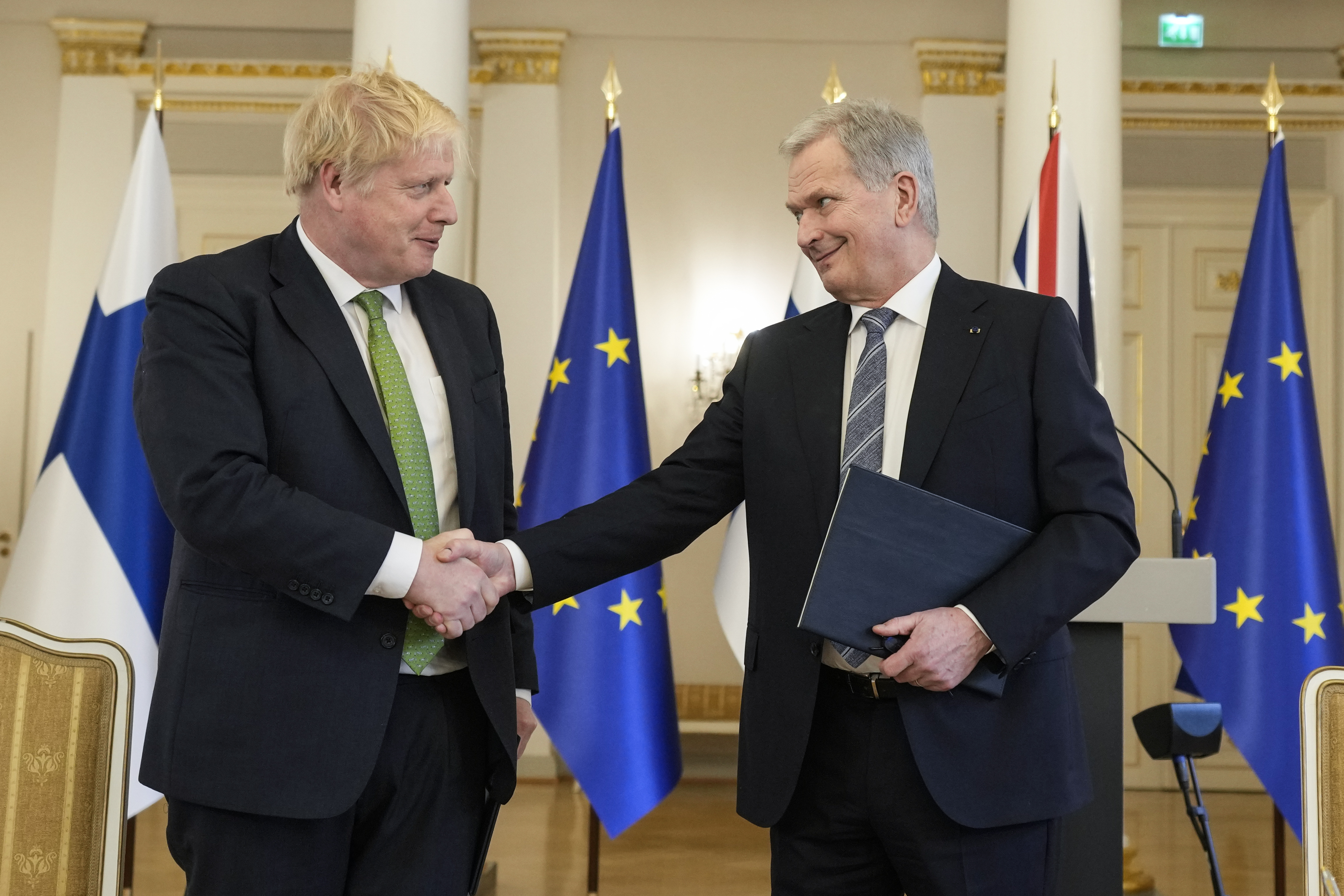 British Prime Minister Boris Johnson, left, and Finland's President Sauli Niinisto shake hands after signing a security assurance, at the Presidential Palace in Helsinki, Finland, Wednesday, May 11, 2022. Britain has signed a security assurance with Sweden and its neighbor Finland, that are both pondering whether to join NATO following Russia's invasion of Ukraine, pledging to "bolster military ties" in the event of a crisis and support both countries should they come under attack. (AP Photo/Frank Augstein, Pool)
British Prime Minister Boris Johnson, left, and Finland's President Sauli Niinisto shake hands after signing a security assurance, at the Presidential Palace in Helsinki, Finland, Wednesday, May 11, 2022. Britain has signed a security assurance with Sweden and its neighbor Finland, that are both pondering whether to join NATO following Russia's invasion of Ukraine, pledging to "bolster military ties" in the event of a crisis and support both countries should they come under attack. (AP Photo/Frank Augstein, Pool)Gallery: Images from Ukraine, month 3
